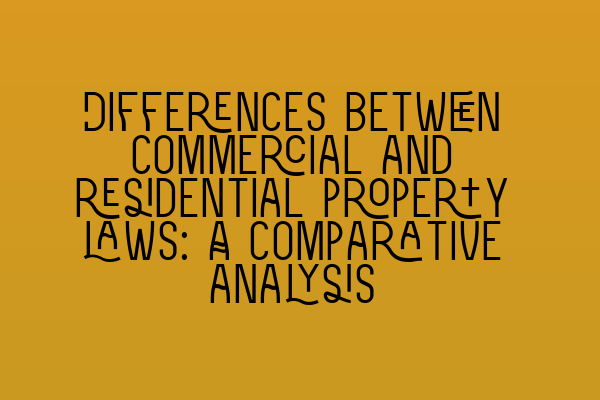Differences between Commercial and Residential Property Laws: A Comparative Analysis
As a property owner or investor, understanding the differences between commercial and residential property laws is crucial for ensuring your rights and responsibilities are protected. The legal framework governing these two types of properties varies significantly, influencing everything from how properties can be used to the rights of tenants and landlords. In this blog post, we will explore the key differences between commercial and residential property laws, providing you with a comprehensive comparative analysis.
1. Purpose and Use
Commercial properties are specifically designed and intended for businesses, such as offices, retail spaces, and industrial units. These properties are primarily used for commercial activities and generating income. On the other hand, residential properties are built for occupation by individuals or families as their primary dwelling place.
Keyword: commercial properties, residential properties
2. Contracts and Leases
When it comes to contracts and leases, commercial properties typically involve longer-term agreements. Commercial leases often span several years, allowing businesses to establish and grow their operations. Residential leases, however, usually cover shorter periods, such as six months or one year, as people’s housing needs can change more frequently.
Keywords: commercial leases, residential leases
3. Landlord and Tenant Relationship
The rights and obligations of landlords and tenants differ significantly between commercial and residential properties. In commercial properties, leases often grant tenants more flexibility in negotiating lease terms, but with fewer legal protections compared to residential leases. Residential tenants, on the other hand, are afforded various rights to ensure their living conditions are safe and habitable.
Keywords: landlord and tenant relationship, commercial tenants, residential tenants
4. Rent Control and Protection
Rent control and protection laws are significant factors in residential property laws. In many jurisdictions, governments set limitations on how much landlords can increase rents and impose strict eviction procedures to safeguard the rights of tenants. Contrarily, commercial properties generally do not have rent control laws, and negotiations between landlords and tenants are more open-ended.
Keywords: rent control, eviction procedures, commercial properties, residential properties
5. Property Maintenance and Repair
Responsibilities for property maintenance and repairs are often shared differently in commercial and residential properties. In commercial properties, tenants are more likely to take on maintenance and repair obligations, while landlords typically handle structural maintenance. For residential properties, landlords usually bear more responsibility for maintaining the property and ensuring habitable living conditions.
Keywords: maintenance and repair, commercial properties, residential properties
6. Planning and Zoning
Planning and zoning regulations have a significant impact on both commercial and residential properties. Commercial properties are subject to more stringent zoning laws and regulations due to their potential impact on the surrounding area, while residential properties are often subject to less stringent zoning restrictions. These regulations affect property usage, aesthetics, and environmental factors.
Keywords: planning and zoning, commercial properties, residential properties
In conclusion, while both commercial and residential properties fall under property law, there are distinct differences between the two. Commercial properties are primarily used for business purposes, involve longer leases, and tend to grant less protection to tenants. Residential properties, on the other hand, are designed for habitation and come with more tenant rights and legal protections. Understanding these differences is crucial for property owners and investors, as it allows them to navigate the legal landscape more effectively and make informed decisions.
At SQE Property Law & Land Law, we specialize in property law and provide expert advice on both commercial and residential properties. Our team of solicitors is well-versed in the nuances of property law and can guide you through any legal challenges or transactions. Contact us today to learn more about how we can assist you with your property law needs.
Keywords: property law, commercial properties, residential properties, legal protections, tenant rights, landlord obligations, comparative analysis, rent control, planning and zoning, property maintenance.
